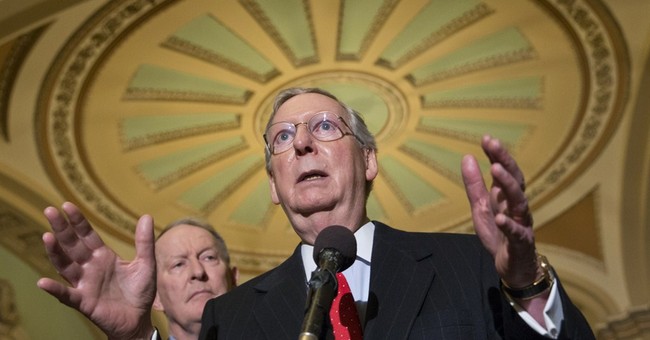
Posted on 04/07/2017 8:01:14 AM PDT by Kaslin

Back when I was a young staffer in the House of Representatives, we viewed the Senate with some disdain. Senators -- and more so their staffs -- were imperious. They viewed themselves as being in the higher chamber and employed arcane rules, most notoriously the filibuster, to block actions they didn't like. But I've learned a thing or two in the more than 40 years since I left my job on the House Judiciary Committee, and I've changed my mind about those Senate rules. Sometimes we need a brake, judiciously applied, to give politicians and the country the time to come together.
I was still in high school when Democrats filibustered the 1964 Civil Rights Act for 60 days, but I remember it as an ugly affair that nonetheless couldn't stop the U.S. Senate from doing what was right. In the end, the Senate mustered the votes of two-thirds of the chamber to move the landmark bill forward, but not before Sens. Robert Byrd, Strom Thurmond, Sam Ervin, Richard Russell and William Fulbright (some of whom later became liberal icons for other reasons) talked around the clock to try to kill the legislation.
As grueling as the process was, it forced debate -- and, yes, that dirty word compromise -- to enact legislation that dramatically altered the course of the country. Had liberal Democrats and Republicans who favored civil rights forced through a bill on 51 votes, the nation might never have fully embraced the changes enacted. The Supreme Court had outlawed segregation in schools in 1954, but the pace of change took decades to accomplish, in part because nine justices, even though girded by the Constitution, couldn't force the social change required. With 71 elected senators embracing the new law, the people had an easier time accepting the historic legislation. Sen. Everett Dirksen -- a Republican who helped secure passage, with larger numbers of his fellow Republicans than Democrats voting in favor -- said it best during the debate: "Stronger than all the armies is an idea whose time has come."
Much has changed since that historic day, not least of all the willingness of partisans on opposite sides to work together. The Senate changed its rule in 1975, lowering to 60 the number of votes needed to end a filibuster. On Thursday, the GOP-controlled Senate changed the rules once again -- this time disallowing a filibuster on Supreme Court nominees altogether, following the precedent set when the Democrats were in control and blocked filibusters for lower-court nominees. I am happy that the eminently qualified Neil Gorsuch will become a Supreme Court justice because of the change, but I'm troubled about what the rule change means for the future of politics in America.
Already we've seen Democrats pass the biggest piece of social legislation in 50 years on a simple party-line vote, the Affordable Care Act, by manipulating the rules that allow certain kinds of legislation to be exempt from filibuster. We're likely to see the same maneuvers if and when the GOP gets its act together to "repeal and replace" Obamacare. And of course, the Democrats' putting in place the rule allowing lower-court judges to be confirmed with less than a supermajority when the Senate was in Democratic hands means the federal courts have already become highly politicized and promise to be more so going forward. This is not a good thing, no matter which party is in control.
Ours has been a remarkably stable democracy, with control of Congress and the White House shifting back and forth election to election but the judiciary less susceptible to such swings. That was how our Founding Fathers intended it; why else make federal judges lifetime appointees? Presidents have wide latitude in making such appointments, and there's no question that judicial philosophy plays a role in whom a president chooses. But in the past, the tempering force of the old Senate rules meant few presidents risked putting forth a nominee who was outside the mainstream. President Donald Trump's nomination of Neil Gorsuch was in that tradition; Gorsuch is a mainstream judge. But Democrats, angry with Trump on a host of issues, chose to dig in their heels -- and Senate Republicans followed the Democrats' example by blowing up the remnants of the old rules.
Political majorities don't last forever, and I'm betting those on both sides of the aisle will have ample opportunity in the future to rue the day they started down this path. I'm welcoming Justice Gorsuch but saying a sorry farewell to a tradition that has helped forge consensus at difficult times.
If they did a real, old school filibuster, it would be OK.
Now it is just a road block.

F all of that. Why do “republicans” insist by playing by other people’s rules. Wait till the muzzies take over!
Without honest debate there can be no real or meaningful discussion. Until we return to civility and honest debate about what is good for America and her people, I feel that the Republic is lost.

I disagree. What they need to do, but probably won’t is to get rid of it for good to include Legislation. If the republicans muck it up while they are in the majority then they deserve to be back in the Minority. All they have to do is to use their Majority to pass legislation that improves the Economy, National Security and promote jobs and lower taxes. If they do this using their Majority without the 60 vote rule, the Democrats will be a Minority party for the next decade plus.
Somebody call a Waaaahmbulance.
[End of Filibuster Not Good for Either Party]
It is good for the U.S. Constitution.
Bullcrap. It was time for it to go.
Make them accountable with a vote on every subject.
Judgment will rest with the voters at the next election.
Make the voters accountable as they won’t be able to
vote for whackjobs secure in the knowledge that
filibusters will stop their most destructive ideas.
Things are now more transparent, accountable and honest.
Filibustering just allowed Senators AND Voters to have their cake and eat it too.
I’m sorry. This is such horse puckey from this author. The political filibuster was manufactured and used for the *1st* time in 2003 BY the RATS to block Bush lower court appointees (IIRC).
And, has been used by the RATS since.
What we are seeing is a return to the Constitution. At NO place in the Constitution does it require a Super majority to confirm judicial appointments. NOWHERE. Completely manufactured. Clarence Thomas 52-48; Alito 58-42; etc...
We did pretty well without it for 200+ years.
End of Filibuster Not Good for Either Party
________________________________________________________
John McCain agrees and will consequently vote FOR it.
Exactly
I understand a SCOTUS nominee has never been filibustered so nothing has changed at all. Removing the filibuster in this case restores the historical norm.
The Senate didn't get rid of the filibuster. They got rid of the filibuster for the Supreme Court - a "tradition" put in place by Hairy Reid in 2003 to block Bush's judges and running directly against the "advice and consent" role given the Senate in the Constitution.
Linda Chavez needs to go back and take a class on the Constitution - if she can find one worth a dime left in this country except at Hillsdale College.
W sure could pick ‘em. /s
Not on appointments it wouldn’t. There is no reason for it to exist on appointments. If you can’t convince 51 other senators that someone is extreme or unfit, you should let them through.
I don’t care if it’s good for either party. Ending the filibuster is good for America. Now let’s kill Obamacare!
The filibuster was created by the Democrats in 1917 and the founders argued against parliamentary type of deliberations...
Disclaimer: Opinions posted on Free Republic are those of the individual posters and do not necessarily represent the opinion of Free Republic or its management. All materials posted herein are protected by copyright law and the exemption for fair use of copyrighted works.